Why and when did you decide to try NeurOptimal® neurofeedback?
I purchased a NeurOptimal® system in 2019 while experiencing a particularly tough and demanding time in my life. I was experiencing burnout and looking for ways to manage stress naturally and improve my brain's functioning. Like everyone, I started googling what I could do to help myself and that's when I came across neurofeedback.
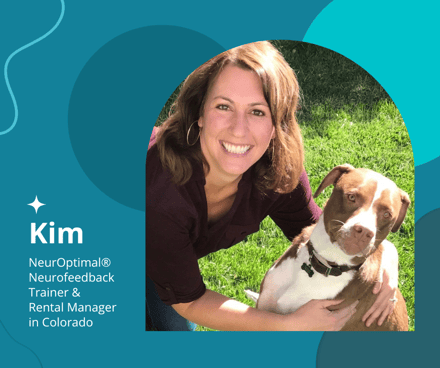
Having a background in psychology, I was somewhat familiar with the concept of brain training so it piqued my interest right away. The NeurOptimal® system was appealing because I could do sessions at home and I could train my whole family. I wanted to be proactive about my mental health and set my family up for success. I compared several systems, determined that NeurOptimal® was the best fit for us and took the leap. I had no idea how valuable it would be as we were soon faced with COVID and a lot of new, unexpected challenges!
What is your background and what kind of work were you doing before becoming a neurofeedback trainer?
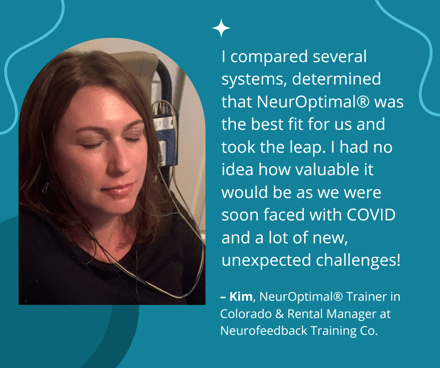 I did my undergrad at Nebraska Wesleyan University where I played volleyball and studied psychology and business. I went on to graduate school and completed my Master's degree in Industrial and Organizational Psychology.
I did my undergrad at Nebraska Wesleyan University where I played volleyball and studied psychology and business. I went on to graduate school and completed my Master's degree in Industrial and Organizational Psychology.
I often get asked, what is I/O Psychology?! It essentially involves applying psychological principles to improve performance and the work environment. Shortly after receiving my degree, my husband and I moved to Dallas, Texas. There I took my first job as a survey and recruiting consultant for a healthcare organization. I was promoted into management consulting and spent over 15 years analyzing and reporting on personality assessment data for employee selection and development purposes. We eventually landed in Colorado where I was on a contract job with IBM until that project was complete.
What skills as an organizational psychologist do you use most as a NeurOptimal® trainer?
As an organizational psychologist, I learned to ask effective questions, listen actively, and recognize individual differences. Now as a NeurOptimal® trainer, these skills add to my ability to understand, connect with and best support clients.
I was really happy to see that you (the Neurofeedback Training Co.) emphasizes with renters the importance of tracking changes with self-reporting tools. As an organizational psychologist, I often utilized interviews and self-report inventories designed to measure personality and temperament so I know how powerful those tools can be to gather meaningful information. For example, some people are naturally more forward-thinking and able to envision possibilities and see challenges ahead. This can be a valuable quality for CEOs and other leaders whose roles require them to plan strategically. I witnessed how much leverage these tools gave companies and I'm excited to help rental clients use them to see the positive changes from brain training.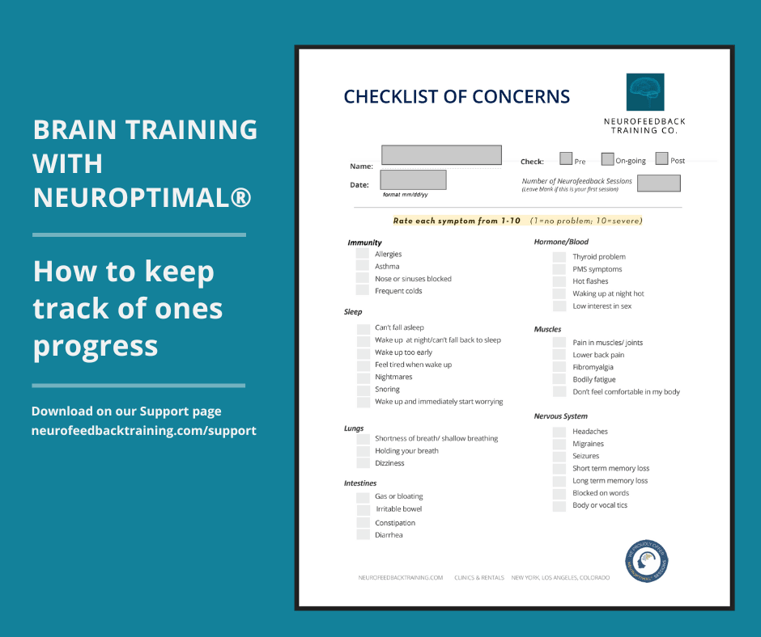
What made you decide to become a neurofeedback trainer?
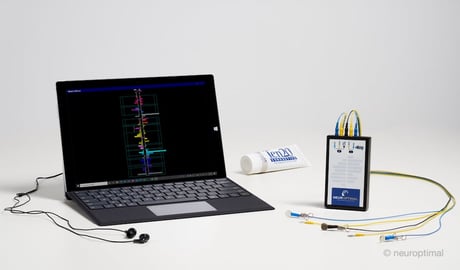 When my system first arrived, I began by running sessions on myself several times a week. Within a short amount of time, I was feeling confident with the process and my whole family was training regularly, including grandparents. We were all enjoying it and experiencing the benefits and that is when I started thinking about the possibility of becoming a certified trainer and sharing neurofeedback with others. I enrolled in an online course through Zengar Institute and completed my certification. I had taken a break from my consulting career to focus on raising our two kids and the timing was right to pursue something new and re-enter the workforce. I have to say, it is satisfying to know that I am doing something that enhances lives and makes a meaningful difference.
When my system first arrived, I began by running sessions on myself several times a week. Within a short amount of time, I was feeling confident with the process and my whole family was training regularly, including grandparents. We were all enjoying it and experiencing the benefits and that is when I started thinking about the possibility of becoming a certified trainer and sharing neurofeedback with others. I enrolled in an online course through Zengar Institute and completed my certification. I had taken a break from my consulting career to focus on raising our two kids and the timing was right to pursue something new and re-enter the workforce. I have to say, it is satisfying to know that I am doing something that enhances lives and makes a meaningful difference.
What are your life experiences or other training you did that help you as a trainer?
Both my husband and I were college athletes so we had to be rather thoughtful and disciplined about diet and how we treated our bodies so we could perform at a high level. That experience influenced my husband’s career path as he completed his doctoral degree at Parker College and works as a chiropractor and kinesiologist. He is frequently researching and recommending homeopathic supplements and remedies in his treatment plans. We prefer natural methods of managing our health as much as possible so neurofeedback fits nicely with the chiropractic model. I bring a holistic approach to my new work and his knowledge and support are an added bonus. It's really nice to have separate but aligned work. We both have passion for helping people be at their physical, mental and emotional best.
Do you still train yourself with neurofeedback?
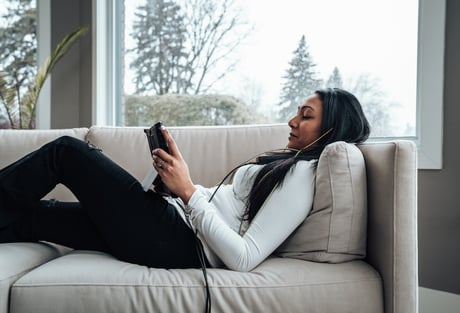 Yes! Life as a mom is often hectic and sometimes self-care can take a back seat to the many other demands that require my attention. However, I do make an effort to train several times a month. Also, if I am feeling particularly scattered or stressed, that is my cue that I am in need of a few booster sessions. I have the best luck with training regularly when I actively schedule it as I would any other appointment…and then stick to it. I know some people prefer waking up and training right away in the morning before the day gets started. I generally wait and do most of my training in the evenings. Anything goes. Regardless of when it happens, it is my opportunity to relax and become centered and in control of my emotions again, and that makes handling day-to-day challenges much easier!
Yes! Life as a mom is often hectic and sometimes self-care can take a back seat to the many other demands that require my attention. However, I do make an effort to train several times a month. Also, if I am feeling particularly scattered or stressed, that is my cue that I am in need of a few booster sessions. I have the best luck with training regularly when I actively schedule it as I would any other appointment…and then stick to it. I know some people prefer waking up and training right away in the morning before the day gets started. I generally wait and do most of my training in the evenings. Anything goes. Regardless of when it happens, it is my opportunity to relax and become centered and in control of my emotions again, and that makes handling day-to-day challenges much easier!
What was the biggest surprise change from neurofeedback, either for yourself or your family?
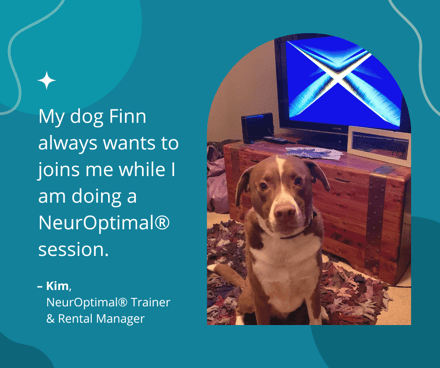 That is part of what is so fascinating to me about neurofeedback and our unique brains…you never know what you might notice! My son was eager to train for enhanced performance in the sports he plays but then he was happy to find how much easier it is to stay organized and follow through on tasks in school. I tend to experience a burst of energy and feel more motivated after most sessions. When that happens, I try to do some cleaning or tackle other projects I’ve been avoiding. Or another example…one day, out of the blue, it hit me that I wasn’t gripping the steering wheel with white knuckles while driving down the interstate during rush hour. I just felt more at ease on the road and there was really no explanation I could come up with other than the neurofeedback I was doing.
That is part of what is so fascinating to me about neurofeedback and our unique brains…you never know what you might notice! My son was eager to train for enhanced performance in the sports he plays but then he was happy to find how much easier it is to stay organized and follow through on tasks in school. I tend to experience a burst of energy and feel more motivated after most sessions. When that happens, I try to do some cleaning or tackle other projects I’ve been avoiding. Or another example…one day, out of the blue, it hit me that I wasn’t gripping the steering wheel with white knuckles while driving down the interstate during rush hour. I just felt more at ease on the road and there was really no explanation I could come up with other than the neurofeedback I was doing.
How has training impacted your family as a whole?
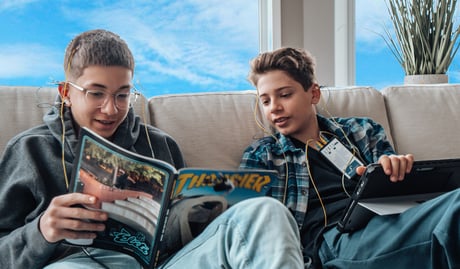 I would say training has been very helpful for all of us. I think the best way to describe it is that we just function a little more smoothly as a family unit. We all experience deeper sleep and less stress and worry overall.
I would say training has been very helpful for all of us. I think the best way to describe it is that we just function a little more smoothly as a family unit. We all experience deeper sleep and less stress and worry overall.
We are more patient with one another and our communication has definitely improved. We can talk about situations or decisions and work through problems more calmly. This benefit has been so valuable. I would highly recommend that all family members train when renting (or owning) a system, not just one person. Everyone can benefit regardless of age or circumstances.
To be honest, I don’t think my teenagers had much interest in or commitment to training when our system first arrived but now that they recognize its value, it has become something they regularly ask to do and will utilize life long.
Watch Related Video:
A teen discuss her long-term benefits of Neurofeedback Training using the NeurOptimal system
What is your favorite population to work with using NeurOptimal® and why?
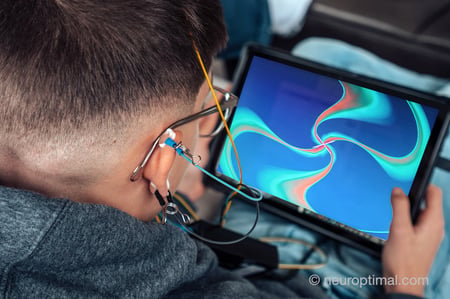 One of the great things about NeurOptimal® is that it is safe and beneficial for all ages. I really enjoy working with teenagers and this is a population I would like to continue to help. They face so many pressures and challenges in life, especially having just gone through COVID. I know the mental health of students has really taken a toll. In a good year, they are stretched thin with school obligations, sports and extracurricular activities. It is nice to give them an opportunity to take a break for 30 minutes and give their brains the opportunity to de-stress. During sessions, I encourage them to just relax and let their unconscious brains do the work.
One of the great things about NeurOptimal® is that it is safe and beneficial for all ages. I really enjoy working with teenagers and this is a population I would like to continue to help. They face so many pressures and challenges in life, especially having just gone through COVID. I know the mental health of students has really taken a toll. In a good year, they are stretched thin with school obligations, sports and extracurricular activities. It is nice to give them an opportunity to take a break for 30 minutes and give their brains the opportunity to de-stress. During sessions, I encourage them to just relax and let their unconscious brains do the work.
I love how teenagers are fascinated by the technology and have a lot of questions about why and how NeurOptimal® works. It's also rewarding to talk through the checklist form and help them develop self-awareness and recognize the shifts that are happening. It’s awesome when "aha moments" happen and I can feel their excitement for the process.